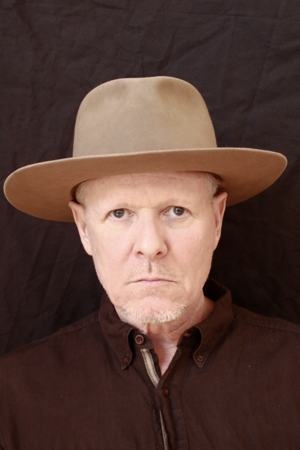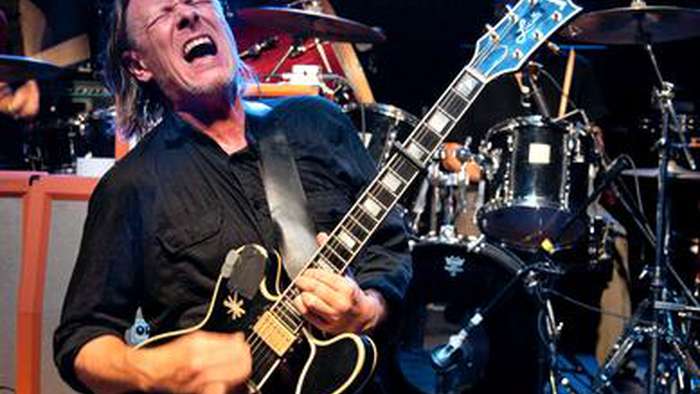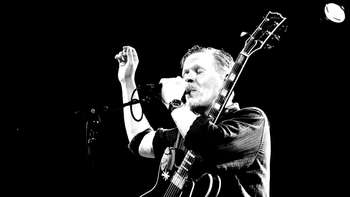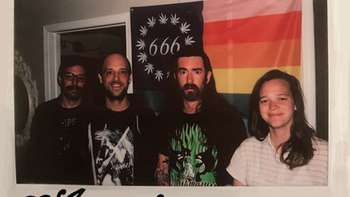Swans are an evergreen, diverse band. In the 1980s they created brutal industrial rock, attracting fans ranging from heavy metal bros to friggin’ Kurt Cobain (he listed 1984’s Young God EP as one of his all-time favorite albums). They shifted towards ambient with 1996’s Soundtracks for the Blind; Terrorizer’s Nick Terry gave it five stars, simply calling it “fucking awesome.” 16 years later, Swans were obliterated with praise. Their grand 2012 album The Seer garnered a 9.0 at Scene Point Blank, and was called one of the top 10 albums of the year by many music outlets.
After all the unstoppable acclaim caused by The Seer, the New York avant-garde ensemble are back again with To Be Kind. It’s two hours of raw, fierce Swans beauty. With guest spots from St. Vincent, Little Annie, and Cold Specks, the new album drops on May 13.
Check out Scene Point Blank’s recent interview with Swans’ head muchacho Michael Gira:
Scene Point Blank: Since Swans’ regrouping in 2010, you’ve released My Father Will Guide Me up a Rope to the Sky, The Seer, and To Be Kind. The latter two are around two hours long and both are 2-disc sets. Additionally, “Bringing the Sun”/”Toussaint L’Overture” is the fourth track on To Be Kind and just over a half-hour long, and The Seer’s title-track is also song number four and just over 30 minutes long. Are the similarities between To Be Kind and The Seer intentional or coincidental?
Michael Gira: It’s just part of how I think it ended up. The songs dictate themselves how long they should be, actually. I just let them stop when it seems like they’ve worn themselves out.
"I still don’t know anything about studio techniques. I just do whatever sounds right. I embrace accidents, I guess."
Scene Point Blank: Karen O and St. Vincent—two of the biggest artists on the indie scene—have worked with Swans. What differentiated their recording styles/habits from each other?
Michael Gira: Well, they’re two different people. And, also, I asked different things of them. Karen sang a very delicate, poignant song [“Song for a Warrior”] —almost like a nursery rhyme—and that required just calm and quiet and a good take, basically. She recorded it, as I recall, pretty much live with a piano. Annie Clark [St. Vincent], I had her sing on several songs [on To Be Kind] and I used her vocals in a way I’ve used female vocals for a long time, which is kind of like and organ or strings—like long sustaining notes—which blend in with the guitars and add sustain and some sense of harmonics. [St. Vincent’s studio work] really wasn’t the same kind of cameo as Karen’s was.
Scene Point Blank: I really enjoy To Be Kind. I’ve noticed that the bass is very prominent, like on “Screenshot,” “Just a Little Boy,” and “Oxygen.” Along with this, what are some other interesting studio techniques you guys used on the record?
 Michael Gira: [Laughs.] I don’t know anything about studio techniques. I’ve been making records for over 30 years, but I still don’t know anything about studio techniques. I just do whatever sounds right. I embrace accidents, I guess.
Michael Gira: [Laughs.] I don’t know anything about studio techniques. I’ve been making records for over 30 years, but I still don’t know anything about studio techniques. I just do whatever sounds right. I embrace accidents, I guess.
Scene Point Blank: You sing about human actions on “Some Things We Do,” the mouth and lungs on “She Loves Us!” and breathing on “Oxygen.” What was your reason for writing lyrics about the human body?
Michael Gira: I’m not sure I’m really writing lyrics about the human body. I’m not sure what I’m writing lyrics about. “Oxygen” is about breathing, that’s true. I think that’s kind of elemental. It’s just something that excites me, also, because I have asthma. I wrote the words to that song when I had a really terrible, life-threatening asthma attack. I revised it later and made it sort of about a state of mind rather than just a specific thing that I experienced. [“Some Things We Do”] is something like what people might recite after a friend had died; “Some Things We Do” [is what] we humans do.
Scene Point Blank: I know that “Oxygen” was originally going to be on My Father Will Guide Me up a Rope to the Sky. Why did you choose for it to appear on To Be Kind?
Michael Gira: Well, it had different music at that point and I didn’t like the music with Swans playing it. It didn’t make sense. So I changed the riff, which is what the bass is playing. I wrote that on acoustic guitar. [Bassist] Christopher Pravdica, of course, makes it more musical than how I would play it. I came up with that groove on acoustic guitar because I wasn’t satisfied with the music of “Oxygen,” but that wasn’t until later when we started playing it live in this new configuration. Then it became a Swans song.
Scene Point Blank: In a 1996 interview with Seconds, you talked about your dismay towards Swans’ audience members, like headbangers and people who spat at Jarboe. Do you still find these types of people in Swans’ audience?
Michael Gira: Almost not at all.
Scene Point Blank: That’s good.
Michael Gira: Yeah, that was an artifact of early on. Well early on, we were completely ignored, of course, for the first two or three years. Later, people started noticing Swans and we got pigeonholed as this sort of loud band, which is really stupid. That attracted metalheads, which we had nothing to do with. I wasn’t too friendly towards those people. Gladly, that’s changed, and now there’s a lot of young people in the audience of all kinds of demographics and interests. I feel very fortunate that way.
Scene Point Blank: Over the course of Swans career, you guys have gradually been recording more and more songs over 10 minutes long. What is the significance of creating longer songs?
Michael Gira: None whatsoever. It’s just, like I say, that the music dictates how long the song is. I just don’t really care about editing things down to make them commercially appealing, or to make them get on the radio, or to make a video—any of that crap. These aren’t typical pop songs anyway, so as long as the groove or the sound seems like it has blood in it, then it should carry on.
Scene Point Blank: I know you’re a big fan of Nina Simone. Has her music influenced Swans?
Michael Gira: Swans? No. Me? Yes.
Only in the sense of trying to be a better performer. She was just a God-like performer, in a sense that the music really inhabited her, and she spoke through the music in a completely sincere, but also very dramatic, self-inflicted way. That’s the sign of a great performer. Maybe she was thinking about cooking eggs, but when she’s singing, you get the impression that she’s completely inside the song.
Scene Point Blank: Who are some of your other favorite classic vocalists?
Michael Gira: Oh, well Howlin’ Wolf is another one of my favorites. There’s a song on the record which is dedicated to him, “Just a Little Boy.” I just love him. He’s not the same kind of performer [as Nina Simone]. It’s not as intense emotionally; it’s more vaudevillian. He’s just a fantastic character and presence, vocally. Other singers? Probably Willie Nelson.
"I know that Bill Clinton is a big Swans fan."
Scene Point Blank: Do you know of any celebrities who are Swans fans?
Michael Gira: Well, I know that Bill Clinton is a big Swans fan. [Laughs.]
Scene Point Blank: I can see that.
Michael Gira: [Laughs.]
Scene Point Blank: You guys have had a very influential and eclectic career. AllMusic lists acclaimed artists like Earth and Godspeed You! Black Emperor to be inspired by Swans’ music. Is there a band/musician today whom you believe really emanates Swans’ music and energy?
Michael Gira: That doesn’t make sense because Swans is itself. No, I don’t think like that. Other people make music. I mean, I guess in the early days I took influence from other groups [but] that’s not really the case now. It’s been going on for quite some time. The main influence is ourself. I’m just trying to push things further within the realm of our aesthetic. As far as anybody else having what Swans has? I don’t think so, and I don’t think that’d be appropriate anyways.
Scene Point Blank: Alright, here’s my last question. This is kind of a generic-sounding, but if Swans had a chance to share the stage with any band in music history, who would it be and why?
Michael Gira: I would share the stage with Ork. He was the first man to bang a rock and shout.
Scene Point Blank: Ok. Well thank you so much for your time.
Michael Gira: Thank you very much.




